

As is the case with humans, dental disease in dogs and cats is an inevitable consequence of ageing and general wear and tear.
Rose Park Veterinary is committed to providing you with the information and treatment you need to care for your pet. Get in touch with us to make an appointment.
severe gingivitis in a cat
Plaque is a film that starts to form on the surface of the tooth from the moment it erupts. Plaque is made up of bacteria, bacterial by-products, saliva, food particles and dead cells from the mouth. With time, plaque turns in to a solid material called calculus which forms when the plaque is mineralised from calcium and magnesium found in saliva.
Plaque irritates the gum and allows bacteria to track deeper down the tooth and under the gum line. This eventually causes deeper inflammation and damages the ligament that holds the tooth in its socket, resulting in red gums, pain, bad breath and loosening of teeth.
More than 85% of dogs and cats over four years old have some form of periodontal disease. It is a common misconception that animals will stop eating if they have gum disease, however, this is not the case as they still have survival instincts to eat to stay alive.
Plaque is a film that starts to form on the surface of the tooth from the moment it erupts. Plaque is made up of bacteria, bacterial by-products, saliva, food particles and dead cells from the mouth. With time, plaque turns in to a solid material called calculus which forms when the plaque is mineralised from calcium and magnesium found in saliva.
Plaque irritates the gum and allows bacteria to track deeper down the tooth and under the gum line. This eventually causes deeper inflammation and damages the ligament that holds the tooth in its socket, resulting in red gums, pain, bad breath and loosening of teeth.
More than 85% of dogs and cats over four years old have some form of periodontal disease. It is a common misconception that animals will stop eating if they have gum disease, however, this is not the case as they still have survival instincts to eat to stay alive.
So look out for the signs such as:
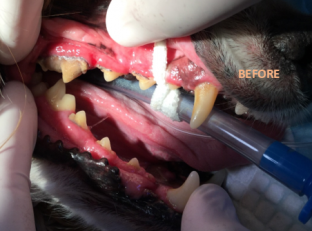
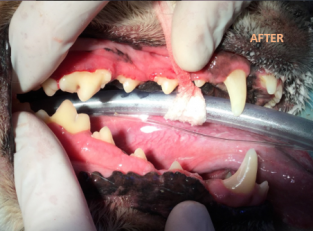
Dental disease in a dog
While dental homecare reduces the rate of plaque and subsequent calculus formation, it is almost inevitable that your pet will require prophylactic scaling of this build up. The aim here is to avoid or at least delay further permanent damage to the teeth. As with humans, a dental scaling may be required as frequently as every 6 to 12 months.
With cats and dogs, a thorough oral examination and dental treatment can only safely be performed under a general anaesthetic. This will require that your pets stay at out clinic for at least half a day. At Rose Park Veterinary Surgery, we have a very high quality dental machine to perform the most thorough treatment possible.
Other than dental cleaning and scaling, dogs and cats often require dental surgery. The most common dental procedures involve extraction of diseased or damaged teeth. Both species often require many teeth to be extracted as a result of advanced periodontal disease, crown fractures or erosions. This may seem upsetting at first, but all of these conditions can cause significant pain that is alleviated rapidly after the teeth in question has been removed.
Where possible, dental home care can reduce plaque formation and avoid subsequent deeper disease in the teeth.
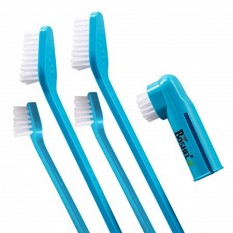
Tooth brushing is considered the most affective form of dental homecare, but it is not always possible in dogs and cats. If you are willing to try brushing your pet’s teeth, it is best to introduce them to the process from a young age. There are specially designed flavoured toothpastes and a variety of brushes. Ask our staff for advice on the best materials and techniques to do this in your pet.
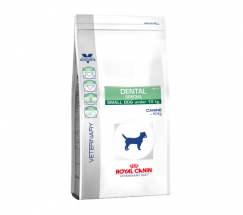
Some Pet Food aid in the reduction of plaque through your pets natural chewing action. While most dry food is not inherently better at removing plaque than softer foods, some commercial dental dry foods have been shown to help control build up. Royal Canin Dental has a larger, more elastic kibble that resists crumbling and allows the teeth to penetrate deeper and clean the surface. It also has a chemical and antibacterial action to reduce the ability for plaque to develop. Ask our staff about some of the products that we would recommend for your pet.
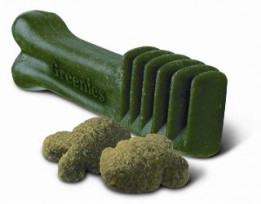
Chewing (not ingesting) raw meaty bones can be useful for plaque control. However, they do create a risk for tooth fractures. The most common dental fractures we see as a result of chewing hard material such as bones are those involving the large upper ‘carnassial’ tooth. Fracture often results in pain, infection and the requirement to surgically remove the tooth. Other possible consequences include gastrointestinal disease including gastroenteritis, constipation and even obstruction of the bowel. It is best to seek veterinary advice if you do choose to give your dog bones, but always ensure that the bones are raw, and large enough that they cannot be swallowed. Alternatively, Greenies use their natural chewing action to wipe away plaque and tartar build-up from the surface of the teeth. The chewy and flexible texture allows teeth to sink in with every bite all the way to the gums for more effective cleaning. The once a day treat is highly digestible, comes in different sizes and are also available for cats.
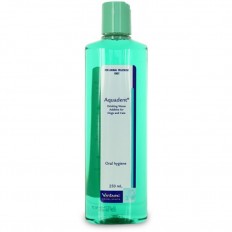
There are also many oral liquid solutions on the market that allege to help with dental hygiene, but few have a proven efficacy. Aquadent and Plaque Off will soften plaque, making it easier to be removed, and will also decrease the amount of bacteria in your pet's mouth. Simply sprinkle on their food or dilute in their drinking water. Again, it is best to seek veterinary advice on the products that could be suitable to use in your pet.